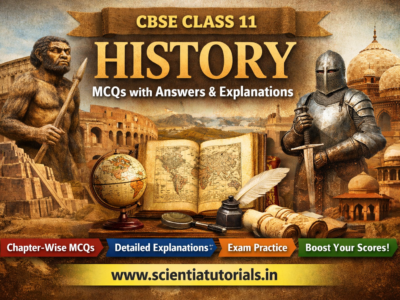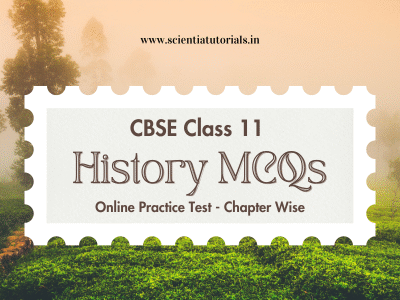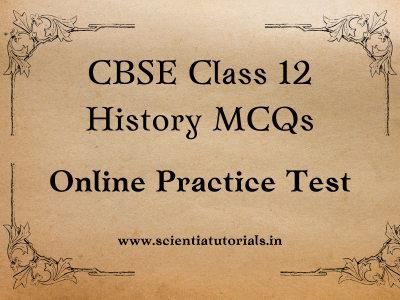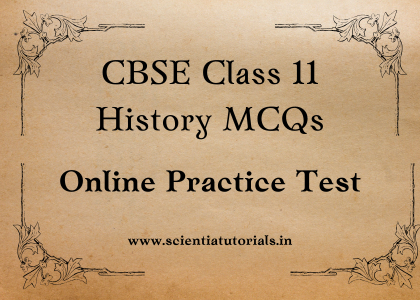CBSE Class 11 History MCQs – Online Practice Test
CBSE Class 11 History syllabus (NCERT-based – Themes in Indian History) Part A: Early Societies Theme 1: From the Beginning of Time Theme 2: Writing and City Life (Mesopotamia) Theme 3: An Empire Across Three Continents (Roman Empire) Part B: …
Overview
CBSE Class 11 History syllabus (NCERT-based – Themes in Indian History)
Part A: Early Societies
Theme 1: From the Beginning of Time
Theme 2: Writing and City Life (Mesopotamia)
Theme 3: An Empire Across Three Continents (Roman Empire)
Part B: Empires
Theme 4: The Central Islamic Lands
Theme 5: Nomadic Empires (The Mongols)
Part C: Changing Traditions
Theme 6: The Three Orders (Feudal Europe)
Theme 7: Changing Cultural Traditions (Renaissance and Reformation)
Theme 8: Confrontation of Cultures (European Expansion)
Part D: Paths to Modernization
Theme 9: The Industrial Revolution
Theme 10: Displacing Indigenous Peoples
Curriculum
- 10 Sections
- 100 Lessons
- Lifetime
Expand all sectionsCollapse all sections
- Part A: Early Societies - Theme 1: From the Beginning of TimePrepare effectively for your board exams with our CBSE Class 11 History MCQs – Online Practice Test with automatic scoring and per-question feedback based on Part A: Early Societies – Theme 1: From the Beginning of Time. These exam-oriented multiple-choice questions are designed strictly as per the latest NCERT Class 11 History syllabus, ensuring complete conceptual clarity on topics like the evolution of humans, the development of tools, and the emergence of early cultures. This interactive quiz provides instant results, detailed explanations, and real-time scoring to help you assess your preparation level. Ideal for students aiming to strengthen their understanding for the CBSE Class 11 History board exam.10
- 1.1The Evolution of Early Humans
- 1.2The Discovery of Fire and Tools
- 1.3Stone Age Cultures Explained
- 1.4Understanding Nomadic Life
- 1.5Development of Language and Communication in Early Societies
- 1.6Hunters and Gatherers
- 1.7The Role of Art and Culture in Prehistoric Societies
- 1.8Evolution of Human Settlements
- 1.9Early Food Producers and Agricultural Revolution
- 1.10Environmental Adaptations of Early Humans
- Part A: Early Societies - Theme 2: Writing and City Life (Mesopotamia)Enhance your exam preparation with our CBSE Class 11 History MCQs – Online Practice Test with automatic scoring and per-question feedback based on Part A: Early Societies – Theme 2: Writing and City Life (Mesopotamia). These NCERT-based multiple-choice questions focus on key topics such as the rise of Mesopotamian civilization, urban planning, trade, temples, and the invention of writing. Designed strictly as per the CBSE Class 11 History syllabus, this interactive quiz offers real-time scoring and detailed feedback to help students analyze their performance instantly. Perfect for board exam preparation, this test ensures conceptual clarity and a deeper understanding of the world’s first urban civilization.10
- 2.1Birth of Mesopotamian Civilization
- 2.2Rise of Urban Centres in Mesopotamia
- 2.3Trade, Temples, and Kings in Mesopotamian Society
- 2.4Writing in Mesopotamia – The Cuneiform Script Explained
- 2.5Role of Priests and Temples in Mesopotamian Economy
- 2.6Social Structure in Mesopotamia
- 2.7Law and Justice in Mesopotamia
- 2.8City Life in Mesopotamia
- 2.9The Importance of River Valley Civilizations
- 2.10Development of Writing Systems
- Part A: Early Societies - Theme 3: An Empire Across Three Continents (Roman Empire)Boost your preparation with our CBSE Class 11 History MCQs – Online Practice Test with automatic scoring and per-question feedback based on Part A: Early Societies – Theme 3: An Empire Across Three Continents (Roman Empire). This interactive quiz covers essential NCERT topics such as the rise and expansion of the Roman Empire, political institutions, trade networks, social classes, and cultural achievements. Designed strictly according to the CBSE Class 11 History syllabus, these exam-oriented MCQs help students strengthen conceptual understanding and assess performance instantly with real-time results and feedback. Ideal for revision and board exam readiness, this test provides a comprehensive learning experience on one of the greatest empires in world history.10
- 3.1Rise and Expansion of Roman Empire
- 3.2Political Institutions in the Roman Republic
- 3.3Roman Society and Slavery
- 3.4Economy and Trade in the Roman Empire
- 3.5Cultural Achievements of Rome – Architecture and Literature
- 3.6Decline of the Roman Empire
- 3.7Role of Christianity in the Roman World
- 3.8Urbanization and Economy of the Mediterranean Region
- 3.9Governance and Citizenship in Roman Times
- 3.10Expansion and Military Power of Rome
- Part B: Empires - Theme 4: The Central Islamic LandsPrepare thoroughly for your exams with our CBSE Class 11 History MCQs – Online Practice Test with automatic scoring and per-question feedback based on Part B: Empires – Theme 4: The Central Islamic Lands. These NCERT-aligned multiple-choice questions cover key topics such as the rise of Islam, the Caliphate, political expansion, cultural and intellectual developments under the Umayyads and Abbasids, and the impact of trade and urbanization. Designed strictly according to the CBSE Class 11 History syllabus, this online quiz offers instant scoring, detailed feedback, and concept-based learning. Perfect for board exam preparation, it helps students strengthen their understanding of the Central Islamic world’s political, economic, and cultural evolution.10
- 4.1Rise of Islam and Prophet Muhammad
- 4.2The Caliphate and Its Administration
- 4.3Expansion of Islamic Empires – Umayyad and Abbasid Rule
- 4.4Trade and Urbanization in Islamic Lands
- 4.5Islamic Art and Architecture
- 4.6Intellectual Developments under Abbasids – Golden Age of Islam
- 4.7Role of Religion and Law in Islamic Society
- 4.8Spread of Arabic Language and Culture
- 4.9Social Structure and Economy in the Islamic World
- 4.10Decline of the Abbasid Caliphate
- Part B: Empires - Theme 5: Nomadic Empires (The Mongols)Master key historical concepts with our CBSE Class 11 History MCQs – Online Practice Test with automatic scoring and per-question feedback based on Part B: Empires – Theme 5: Nomadic Empires (The Mongols). These NCERT-based multiple-choice questions explore the rise of the Mongol Empire under Genghis Khan, their military conquests, political organization, trade routes, and cultural exchanges across Eurasia. Designed strictly as per the CBSE Class 11 History syllabus, this interactive quiz provides instant scoring, detailed feedback, and performance analysis to enhance exam readiness. Ideal for board exam preparation, it helps students gain a deeper understanding of how the Mongols shaped world history through their vast empire and global connections.10
- 5.1Rise of the Mongol Empire
- 5.2Life of Genghis Khan – Leadership and Conquests
- 5.3Expansion and Administration of the Mongol Empire
- 5.4Cultural Exchange under the Mongols
- 5.5Trade Routes and Silk Road under Mongol Rule
- 5.6Role of Nomads in Eurasian History
- 5.7The Impact of Mongol Invasions on Civilizations
- 5.8Political Organization of Mongol Tribes
- 5.9Decline and Legacy of the Mongol Empire
- 5.10The Mongols and Global Connections
- Part C: Changing Traditions - Theme 6: The Three Orders (Feudal Europe)Strengthen your preparation with our CBSE Class 11 History MCQs – Online Practice Test with automatic scoring and per-question feedback based on Part C: Changing Traditions – Theme 6: The Three Orders (Feudal Europe). These NCERT-based multiple-choice questions cover key concepts such as the structure of feudal society, roles of the clergy, nobility, and peasants, as well as the economic and political changes that shaped medieval Europe. Designed strictly according to the CBSE Class 11 History syllabus, this online quiz offers instant scoring and detailed explanations to help students analyze their understanding effectively. Ideal for board exam practice, it provides a comprehensive review of feudalism and the transformation of European society during the Middle Ages.10
- 6.1Feudalism in Medieval Europe
- 6.2Structure of Feudal Society – Lords, Vassals, and Serfs
- 6.3Role of the Church in Medieval European Society
- 6.4Growth of Towns and Trade in Medieval Europe
- 6.5The Crusades and Their Impact
- 6.6Decline of Feudalism
- 6.7Economic and Political Changes in Medieval Europe
- 6.8Peasant Life and Feudal Duties
- 6.9The Rise of Monarchies in Europe
- 6.10Transition from Feudalism to Capitalism
- Part C: Changing Traditions - Theme 7: Changing Cultural Traditions (Renaissance and Reformation)Boost your exam preparation with our CBSE Class 11 History MCQs – Online Practice Test with automatic scoring and per-question feedback based on Part C: Changing Traditions – Theme 7: Changing Cultural Traditions (Renaissance and Reformation). These NCERT-aligned multiple-choice questions focus on key developments such as the rise of humanism, the revival of classical learning, the growth of art and science during the Renaissance, and the major religious transformations brought by the Reformation and Counter-Reformation. Designed strictly as per the CBSE Class 11 History syllabus, this interactive quiz offers real-time scoring and detailed feedback to enhance conceptual understanding. Ideal for board exam preparation, it helps students explore Europe’s intellectual and cultural rebirth effectively.10
- 7.1The Renaissance in Europe
- 7.2Humanism and the Growth of Learning
- 7.3Role of Art and Artists during the Renaissance
- 7.4The Printing Revolution – Gutenberg’s Legacy
- 7.5Reformation Movement – Martin Luther and Protestantism
- 7.6Counter-Reformation – Catholic Church’s Response
- 7.7Scientific Revolution and Modern Thinking
- 7.8Impact of Renaissance on European Society
- 7.9Thinkers and Reformers
- 7.10Transformation of European Culture
- Part C: Changing Traditions - Theme 8: Confrontation of Cultures (European Expansion)Prepare for your board exams with our CBSE Class 11 History MCQs – Online Practice Test with automatic scoring and per-question feedback based on Part C: Changing Traditions – Theme 8: Confrontation of Cultures (European Expansion). These NCERT-based multiple-choice questions cover major historical developments such as the Age of Exploration, voyages of Columbus and Vasco da Gama, colonization of the Americas, and the cultural, economic, and social consequences of European expansion. Designed strictly as per the CBSE Class 11 History syllabus, this online quiz provides instant scoring, detailed explanations, and performance insights. Ideal for exam preparation, it helps students understand how European encounters transformed global trade, societies, and cultures.10
- 8.1Age of Exploration and Discovery
- 8.2Voyages of Columbus, Vasco da Gama, and Magellan
- 8.3Colonization of the Americas – Causes and Consequences
- 8.4Role of Trade and Mercantilism in European Expansion
- 8.5The Impact of European Conquest on Indigenous Societies
- 8.6Growth of Plantation Economy and Slave Trade
- 8.7Cultural Exchange and Conflict in the New World
- 8.8Christian Missionaries and Colonization
- 8.9Economic Transformation of Europe
- 8.10Global Impact of European Expansion
- Part D: Paths to Modernization - Theme 9: The Industrial RevolutionRevise effectively with our CBSE Class 11 History MCQs – Online Practice Test with automatic scoring and per-question feedback based on Part D: Paths to Modernization – Theme 9: The Industrial Revolution. These NCERT-based multiple-choice questions focus on key aspects such as the causes of industrialization, major inventions, technological advancements, and the social and economic changes that shaped modern Europe. Designed strictly according to the CBSE Class 11 History syllabus, this interactive quiz provides real-time scoring, detailed feedback, and conceptual clarity. Ideal for board exam preparation, it helps students understand how the Industrial Revolution transformed economies, labor systems, and societies, paving the way for modern industrial development.10
- 9.1Causes of the Industrial Revolution
- 9.2Inventions and Discoveries of the Industrial Age
- 9.3The Factory System and Urbanization
- 9.4Social Impact of Industrialization in Britain
- 9.5Working Class Movements and Labour Laws
- 9.6Spread of Industrialization to Other Countries
- 9.7Industrial Capitalism and Its Global Impact
- 9.8Technological Advancements of the 18th–19th Centuries
- 9.9Environmental and Social Changes in Industrial Society
- 9.10Economic Changes in Modern Europe
- Part D: Paths to Modernization - Theme 10: Displacing Indigenous PeoplesEnhance your exam readiness with our CBSE Class 11 History MCQs – Online Practice Test with automatic scoring and per-question feedback based on Part D: Paths to Modernization – Theme 10: Displacing Indigenous Peoples. These NCERT-aligned multiple-choice questions explore the expansion of European settlers in North America and Australia, the displacement and resistance of indigenous communities, and the lasting impact of colonization on native societies. Designed strictly according to the CBSE Class 11 History syllabus, this interactive quiz provides instant scoring, detailed feedback, and performance analysis. Perfect for board exam preparation, it helps students understand the social, economic, and cultural consequences of imperial expansion and indigenous displacement in the modern world.10
- 10.1Expansion in North America and Australia
- 10.2Conflict between Settlers and Indigenous Peoples
- 10.3Policies of Land Seizure and Displacement
- 10.4Resistance and Survival of Indigenous Communities
- 10.5Economic Exploitation and Cultural Suppression
- 10.6Native Americans and Aboriginal Australians
- 10.7Exam-Oriented MCQs on Imperial Expansion
- 10.8Colonialism and Indigenous Resistance
- 10.9Migration, Labour, and Global Connections in the 19th Century
- 10.10Historical Legacy of Displacement and Colonization




